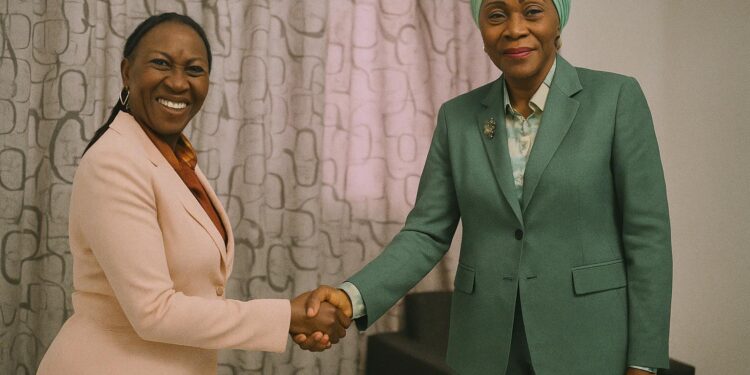Strategic Convergence Across the Atlantic
The discreet meeting in Brazzaville between Transport Minister Ingrid Olga Ghislaine Ebouka-Babackas and Venezuelan Ambassador Laura Evangelia Suárez may appear ceremonial, yet it signals a calibrated repositioning of South-South diplomacy. Both nations command Atlantic coastlines and sit on sizeable hydrocarbon reserves, but the current dialogue aims to transcend the traditional energy narrative. By foregrounding shipping and aviation, the two capitals are pursuing corridors of resilience that could blunt the volatility of oil prices while projecting influence across the Gulf of Guinea and the Caribbean.
Revisiting the 2023 Caracas Joint Commission
At the inaugural joint commission in Caracas in October 2023, ministers initialled three accords covering port management, merchant marine training and reciprocal air services. Officials close to the file insist that the documents received legal vetting earlier this year, paving the way for technical committees to draft implementation schedules. According to figures from the International Maritime Organization, Congo’s Pointe-Noire already handles over 800,000 TEU annually, while Venezuela’s La Guaira container terminal is operating at barely half its designed capacity. Planners on both sides see complementarity: Venezuelan expertise in dry‐dock engineering could accelerate Congo’s ship-repair ambitions, whereas Congolese know-how in Central African cabotage could offer Caracas access to a growing hinterland market.
Maritime Synergies: Port Modernisation and Blue Economy
The Pointe-Noire deep-water expansion, supported by multilateral lenders, has reached its second phase, with dredging to 16.5 metres now completed. Venezuelan port authorities, experienced in handling Panamax vessels after the 2015 overhaul of Puerto Cabello, propose a twinning programme that would allow Congolese dockworkers to receive on-site training in cargo digitisation. The conversation also touches on fisheries management and marine environmental standards aligned with the London Convention. Analysts note that the prospective transfer of hydrographical data could improve coastal surveillance for both countries, whose exclusive economic zones have occasionally faced illicit fishing pressures (UNCTAD maritime statistics, 2023).
Aviation Ambitions and Regional Connectivity
Civil aviation represents another pillar of the emerging partnership. The bilateral air services agreement contemplates fifth-freedom rights linking Caracas to Brazzaville via West African hubs. For the Congolese carrier Equaflight and the Venezuelan airline Conviasa, shared maintenance protocols and joint training could reduce operational costs. Industry observers point to the International Air Transport Association forecast that Africa–Latin America passenger flows could grow by 4.8 percent annually over the next decade, provided adequate route development. By synchronising safety oversight with the International Civil Aviation Organization’s universal audit findings, both regulators aim to maintain Category 1 status—a prerequisite for future code-share arrangements with European and Gulf carriers.
Women, Small Business and the Nuances of Soft Power
Diplomacy was subtly flavoured with cacao and honey when the ambassador presented artisanal products, including the evocatively branded “Miel de femme.” Far from a courtesy gesture, the offering underlines an agenda of gender-responsive trade. The Congolese delegation highlighted the presidential initiative to expand women-run cooperatives in agribusiness. Venezuela, for its part, reports that more than 60 percent of its small-scale exporters are female-led (Venezuelan Ministry of Popular Economy, 2024). By circulating emblematic commodities, the two governments adopt a soft-power strategy that humanises macro-economic accords and courts public opinion in favour of integration.
Diversification Beyond Hydrocarbons: A Diplomatic Imperative
Although both states remain members of OPEC, their policy suites increasingly reference diversification. The Congolese National Development Plan 2022-2026 designates logistics and blue economy as growth accelerators, while Venezuela’s Gran Misión Ciencia aims to lift non-oil exports to 20 percent of foreign-exchange earnings by 2030. Collaborative ventures in port services, cargo handling software and aviation ground support embody pragmatic steps toward those benchmarks. The ability to draw on each other’s comparative advantages could mitigate external shocks such as sanctions or commodity downturns, giving the partnership a clear geo-economic rationale.
Outlook for South-South Technical Cooperation
Next on the agenda is the establishment of a joint observatory tasked with monitoring key performance indicators, from vessel turnaround time to on-time flight departures. Officials envisage a first-ever maritime and aviation business forum to be held in Brazzaville early next year, an idea currently circulating among the respective chambers of commerce. Observers from the Economic Commission for Africa argue that, if successful, the Congo-Venezuela pilot could serve as a template for other Atlantic counterparts seeking alternative value chains. For now, the diplomatic choreography remains measured, yet the signal is clear: Brazzaville and Caracas are scripting a new chapter in South-South cooperation—one that marries hard infrastructure with the softer currents of culture and entrepreneurship.












































